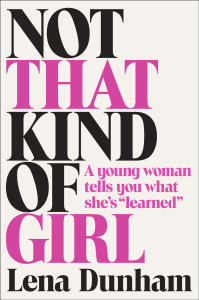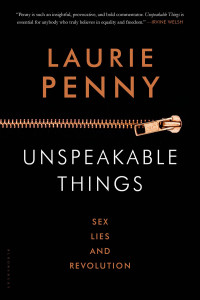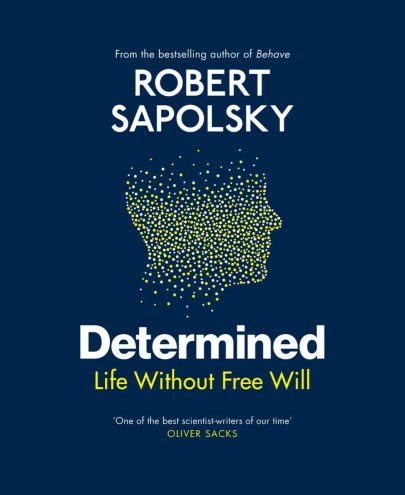May 7, 2015 Books
First published in the April 2015 issue of Metro. Illustration by Anna Crichton.
Not That Kind of Girl: A Young Woman Tells You What She’s “Learned”
Lena Dunham
(Fourth Estate, $35)
Unspeakable Things: Sex, Lies and Revolution
Laurie Penny
(Bloomsbury, $35)
Last year, the new Minister for Women, Louise Upston, declared she would “never call [herself] a feminist”, because she wasn’t interested in “being a flag waver”.
Ms Upston not only belittled the achievements of the movement that had led to the creation of the very ministry she now headed, she also revealed her ignorance of the way feminism among a younger generation of women has now become mainstream.
These days, feminists don’t wave flags, they wave wands. Only a couple of months earlier, 24-year-old British actress Emma Watson — Hermione in the Harry Potter films — gave a speech about feminism to the UN. She proudly described herself as a feminist, and pointed out that, “for the record”, feminism is “by definition the belief that men and women should have equal rights and opportunities. It is the theory of political, economic and social equality of the sexes.” The speech has been viewed more than 6.7 million times on YouTube.
It hardly seemed like something a Minister for Women could object to. Closer to home, then-17-year-old Ella Yelich-O’Connor, having just won Song of the Year for “Royals” at the 2014 Grammy Awards, said in an interview: “the idea that feminism is completely natural […] shouldn’t even be something that people find mildly surprising. It’s just a part of being a girl in 2013.”
Also last year, two other young women — one an American, one a Briton, both aged 28 — published feminist books. Lena Dunham’s Not That Kind of Girl and Laurie Penny’s Unspeakable Things are very different beasts, as are the types of feminism they promote. But both share a particular confessional mode of “doing” feminism — and it’s a mode we don’t see much of among New Zealand writers of their generation.
 Dunham is the creator and star of Girls, the HBO series about a group of twenty-something women navigating work and relationships in post-recession New York. Six months after Girls premiered, Dunham was offered a $US3.7 million advance for Not That Kind of Girl.
Dunham is the creator and star of Girls, the HBO series about a group of twenty-something women navigating work and relationships in post-recession New York. Six months after Girls premiered, Dunham was offered a $US3.7 million advance for Not That Kind of Girl.
So is it worth that kind of money? Well, it’s a diverting read. It’s a memoir: chatty, humorous, illustrated with line drawings reminiscent of those in books directed at 10-year-old girls. It contains a series of short, essayistic chapters, interspersed with Bridget Jones’s Diary-type lists (“18 Unlikely Things I’ve Said Flirtatiously”; “My Top 10 Health Concerns”) and organised into sections (“Love & Sex”, “Body”, “Friendship”, “Work”).
Dunham recounts stories from her bohemian childhood, her time at college, her working life before and after Girls. If you’ve watched the TV show, you’ll find some of the material familiar, but the narrator of the book is more likeable than Hannah Horvath, Dunham’s self-involved character on the show. Still self-involved, but also apologetically aware of it. Makes her endearing.
Dunham’s brand of feminism envisages a world in which women talk about their experiences openly and unashamedly, convinced of the worth of what they have to say: “As hard as we have worked and as far as we have come, there are still so many forces conspiring to tell women that our concerns are petty, our opinions aren’t needed, that we lack the gravitas for our stories to matter.”
In terms of articulating her feminist philosophy, she doesn’t go much further than this, although she name-checks Gloria Steinem and Nora Ephron as the “women who would come to guide me”. Not That Kind of Girl is her way of being the change she wants to see in the world: she is frank and funny about her experiences of sex and sexism, about her weight, her reproductive organs…
In sharing her personal responses to traditionally taboo aspects of female experience, Dunham steps into the same territory as British journalist Caitlin Moran, in her How to Be a Woman, from 2011.
Moran’s book is funnier, and benefits from a journalistic sense of duty to consider the wider context. It’s also more explicit about its feminist agenda although, as with Dunham, the feminist issues Moran considers are those that preoccupy middle-class Western women: body consciousness, sex in the age of internet pornography, reproductive choices.
And this is the thing about Not That Kind of Girl. Its high points — Dunham’s striking imagery (“I was too tired to crumple my face when I cried”), the poetic deftness with which she narrates her experience of what she can only in hindsight refer to as rape — cannot hide the fact her stories resonate most strongly with young, straight, middle-class, white women. Women like Dunham herself.
There’s nothing wrong with this. So long as popular culture bombards us with depictions of one particular type of straight, middle-class, white woman, there is a pressing need for antidotes. Dunham is “not that kind of girl” in that she is overweight, career driven, successfully medicating her anxiety, and really doesn’t care what people think.
But at the same time she is a particular “kind of girl”, trawling several different kinds of privilege. When she says in an interview, “There’s not one experience that exists in the book (besides possibly being naked on television) that I feel other women couldn’t connect or relate to,” Hannah Horvath and her blinkered worldview are back.
Particularly as one of the experiences is a four-day sojourn with her boyfriend in the Chateau Marmont. In presenting her memoir as a feminist self-help manual, in the hopes that reading it will “make one menial job easier for you, or prevent you from having the kind of sex where you feel you must keep your sneakers on in case you want to run away during the act”, Dunham needs to be upfront about the probable identity of this “you”.
 At least, that’s what Laurie Penny would say. Penny, by her own admission, is “constantly checking [her] privilege in the manner of an anxious homemaker constantly checking that the gas is off”. She is a columnist and contributing editor for the New Statesman; her website describes her as “a writer, a journalist, a public speaker, an activist, a feminist, a reprobate and a geek”. Like Dunham, she is educated, white and middle-class.
At least, that’s what Laurie Penny would say. Penny, by her own admission, is “constantly checking [her] privilege in the manner of an anxious homemaker constantly checking that the gas is off”. She is a columnist and contributing editor for the New Statesman; her website describes her as “a writer, a journalist, a public speaker, an activist, a feminist, a reprobate and a geek”. Like Dunham, she is educated, white and middle-class.
Unlike Dunham, she is explicit about who feminism can and should benefit: queer women, poor women, black women, transgender women — and, crucially, men. These are the people whom Penny believes are most in need of a feminist revolution — or, as she calls it in Unspeakable Things, “mutiny”.
(Of course, when Penny defines her ideal readership as the minorities she calls “the unspeakable ones, the unnatural ones, the ones who upset people”, she ignores the reality of the readership for books like this. She is better than Dunham at acknowledging that “other women” do not share her privilege, but her book is unlikely to attract a markedly different readership.)
On the very first page of Unspeakable Things, Penny distances herself from the type of feminism that underpins memoirs like Not That Kind of Girl and How to Be a Woman. This book, while also written in the first person and containing passages of memoir, “is not a cheery instruction manual for how to negotiate modern patriarchy, with a sassy wink and a thumbs-up”.
It is, instead, an explicit and angry dissection of how the patriarchy, in cahoots with capitalism and neoliberalism, has let everybody down. “Feminism has never been just about liberating women from men, but about freeing every human being from the straitjacket of gender oppression.”
In five chapters, none of which are short on emotive language, Penny persuasively lays out the reasons why — particularly for her generation — the stories we tell ourselves about sex and love and femininity and masculinity and capitalism are wrong, and damaging.
She belonged to the Occupy movement and for her, feminism and socialism are intertwined. While Dunham can state in an interview that she’s not worried if feminism “has to become a brand in order to fully engulf our culture and make change”, Penny would retort that we will only effect change if we refuse to keep speaking the language of brands, of markets, of profit and competition.
Reading Penny after Dunham is like having a cold shower after a hot bath — refreshing and not entirely comfortable. Her polemic is full of skilfully executed rhetorical flourish, though at times it’s also repetitious and unnuanced.
What makes Unspeakable Things more than just a well-argued rant, however, are the integrated passages of memoir. Discussing the way our culture of body consciousness is ruining young women’s lives, Penny describes her own hospitalisation for anorexia nervosa. Outlining the damaging effect of the masculine behaviour licensed by patriarchal societies, she recounts her emotions on confronting the man who raped her as a teenager.
And in a chapter about the unrealistic romantic expectations created by a society that encourages men and women to aspire to monogamous, life-long, heterosexual partnerships, she describes, in a cascade of juddering prose, her heartbreak at the failure of a polyamorous relationship with a man and another woman.
It is these confessional passages that stick in the mind, earthing the ideas they accompany more effectively than pure didacticism would. This is why, for all their ideological differences, Lena Dunham and Laurie Penny can be said to be “doing” feminism in the same way.
Both Not That Kind of Girl and Unspeakable Things contribute to a growing body of populist books by young feminist writers that have made the sharing of personal information an integral part of the genre.
Why aren’t young New Zealand women writing these types of books? There are certainly elements of young women’s experience in 21st-century Aotearoa that cannot be covered off by British and American writers.
Is it because mainstream youth feminism is becoming associated with the baring of private details about one’s life, and the country is frighteningly small? Is it because the country’s publishers cannot adequately support young writers at a stage of their lives when they lack the financial stability — and thus the time — to devote themselves to a book-length project?
Or is it because we have created a culture that is genuinely inhospitable to young women’s dissenting voices?
Time and again, throughout Unspeakable Things, Laurie Penny identifies neoliberalism as the thing that has done the most harm to her generation. “Neoliberalism, while extolling the ‘career woman’, reviles poor women, women of colour, sex workers and single mothers as hopeless dependants, sluts and thieves… It cannibalises our ideals of freedom and regurgitates them as strategies of social control.”
Recently, a New Zealand woman of around Penny’s age spoke poorly of neoliberalism, using language that, while strong, was nevertheless moderate in comparison to Penny. None other than our Prime Minister piped up to say her opinion was of no consequence.
Given what she’s already had to deal with, Eleanor Catton is the last person who should be freighted with the responsibility of being the voice of youth feminism in this country. But it is true we need more of them, writing and speaking in places where their voices will be heard by the many rather than the few, and not scared to foreground their own personal experiences when they do so.
Among those commentators who considered the furore created by Catton’s observations, Morgan Godfery isolated what was perhaps most troubling about the whole affair. Noting that John Key’s government had “form attacking women who criticise it”, he asked simply, “How many women will be discouraged from thinking in public?”
Both Penny and Dunham have spoken of the misogynistic vitriol occasioned by the publication of their books: the personal abuse they received simply for having had the audacity to talk about being young women, let alone young feminist women. Much of this abuse came from online sources, the explicit verbal aggression enabled by internet anonymity. New Zealand, by dint of its small size, is surely the place where we can, in Catton’s words, hope for better — and expect it.
It is precisely because of the greater likelihood of chance meetings between writer and reader — at public events, in airports, at supermarkets — that more young New Zealand feminists should start drawing on their personal experiences to write about the world they want to live in, trusting to common courtesy that, while they might be disagreed with, they will at least be listened to.





